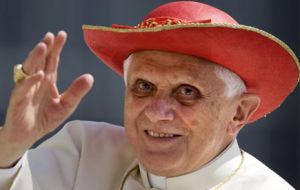MercoPress. South Atlantic News Agency
Forty years ago the Catholic Liberation Theology was born in Latinamerica
 Cardinal Ratzinger, now Pope Benedict, was named by John Paul II to appease the influence of the new theory
Cardinal Ratzinger, now Pope Benedict, was named by John Paul II to appease the influence of the new theory Four decades ago a book written by a Peruvian priest sent shockwaves inside the Latinamerican Catholic Church having set the foundations for what was known as the Liberation Theology.
Accused of Marxist ideology for having proposed God’s option for the poor and needy, nevertheless it was also praised for having helped renew the Church’s message.
The book “The Liberation Theology, prospects” written by Peruvian born Dominican priest Gustavo Gutierrez and released in 1971, is considered the intellectual founding act for the theory and gave its name to the most important theological movement born in the Americas.
In a Latin America at the time trapped by social inequality and military dictatorships (1960/1970) the idea immediately caught the attention of vast sectors of the population, all the way from Nicaragua to the Philippines.
“The idea was that God supported the peoples of the Third World, that he was at their side in the search for the promised land, but a promised land which meant plots to toil, freedom, justice and dignity”, according to Professor Jeffrey Klaiber a religious historian from the Catholic University of Lima, Peru.
Father Gutierrez said that for the liberation theology, poverty meant social insignificance, not only economic but also exclusion, “a picture of the misery it means to be poor in Peru”.
The liberation theology and the option for the poor picked up under Pope Paul VI (1963/1978) who named progressive bishops with strong support from grass-root Catholic organizations.
However when John Paul II (1978/1994) reached Rome the impulse was frozen since the anticommunist pope from Soviet Poland believed it promoted class struggle and he countered naming conservative bishops fearing the loss of the medium and high income faithful that help finance the Church.
The counter offensive besides conservative bishops included two documents (Instructions) on the issue from the Holy Faith Congregation (former Inquisition) headed by Joseph Ratzinger, currently Pope Benedict.
The first instruction was negative but the second a bit more positive since it stated that the history of Christians is a history of liberation, freedom and Catholics must support freedom.
However Gutierrez, looking back to his many interviews with Ratzinger between 1984/86, argues that misunderstandings when they emerged “were talked over through sustained and successful dialogue”.
The paradox is that Rome with the 1962 Vatican Concillium and the Latinamerican Episcopal Conference in 1968 was the inspiration for the liberation theology, and although long quietened “it remains very much alive and active in poor and indigenous parishes, albeit nobody uses the word fearing the Vatican hierarchies under conservative control.
Pope John Paul II was the first to name in Peru, a member of the extreme conservative Opus Dei movement, Cardinal Juan Luis Cipriani.
But Gutierrez was not the only pioneer of that revolutionary spirit: he was joined by Brazil’s Leonardo Boff and Colombia’s Camilo Torres who eventually joined the guerrillas of his country.
Archbishops Oscar Romero from El Salvador killed by the military in 1980 and Brazil’s Helder Camara from the impoverished northeast became icon references for the liberation theology which ended having its main base of action in Brazil.




Top Comments
Disclaimer & comment rules-

-

-

Read all commentsJust like right-wing interpretations of the New Testament - interpretations that put private property at the center of a mora life -, left-wing ones are also adding into the book they're supposed to be reading. The Christian ethos is but an imitation of that of the Stoics - it preaches indifference to the outward world, not rebellion or support. It is thus apolitical. Christianity, pure Christianity, is concerned only with internal 'realities'.
Dec 21st, 2011 - 02:49 am 0The liberation theology is just comunist politics hidden under the priest's cassock.....to use and abuse of the believers.....as well as the comunist fanaticism the religious fanaticism is as the opium for the people (the one concept I agree with Marx's thoughts)
Dec 21st, 2011 - 05:00 pm 0They justified the violence and hate between the inhabitants of the Latam countries just for politic gains to win the control trought the armed fight against the legal Gvts.
3 Don't forget that your grandpa was a priest...
Dec 21st, 2011 - 07:20 pm 0Commenting for this story is now closed.
If you have a Facebook account, become a fan and comment on our Facebook Page!